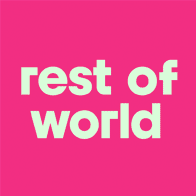Twelve Projects: Helping Refugees + Understanding Policy 🇺🇦 (Update 3.1)

But I don't know where to start?
💶 Have a couple of euros extra? Donate.
🏠 Have accommodation that you don't use? Provide accommodation for refugees.
🧰 Have a helpful skill? Help with that skill.
This is not limited to the Ukraine situation. There are enough people in this world displaced by wars. Help them out if you can.
The Ukraine War hits home.
- I am a war refugee myself. My parents fled with me from Yugoslavia to Austria.
- The current Russian regime is a continuation of oppressive politics that has haunted our families over the past decades (deportation; killing; etc.).
- I have family and friends in both Russia and Ukraine right now.
No matter how hard it is for someone like me, there's millions of people who are trying to survive and escape right now.
My friend Philipp challenged me to funnel my emotions (anger; anxiety; uncertainty) into something useful. I'm glad we had this conversation.
In this newsletter I'll share with you what I've done so far and what might be next. I'm doing this to see if you have any feedback or ideas that could help.
Ukraina Guide: Documenting Helpful Information 📒
Over the past days, I created a website with helpful resources for refugees of the Ukraine War.
Landing on a Helpful Idea
On the second day of the war, some Ukrainian friends (primarily the women of the family) made it to Vienna. Their next question was: Now what?
My mom asked me to look into visa rules for Ukrainian citizens trying to stay in Austria 🇺🇦 🇦🇹
A couple of hypotheses:
- There are most likely more people who have this question
- There are most likely people who have this question for other countries (Poland; Romania; etc.)
- Navigating bureaucracies is difficult
- Navigating information in emotional distress is overwhelming
- Navigating information during an information war is difficult (what's truthful vs. what's incorrect/fake)?
Bottomline: Many people (n) are trying to access the same information (1).

Step #1: Create Notion Database
The idea: Create a Notion database with the following functions:
- Create a country database
- Create a visa database
- Create a transportation database
- Create a "links/helpful resources" database
Once this is in place, relate all entries of databases #2 - #4 to the relevant countries.
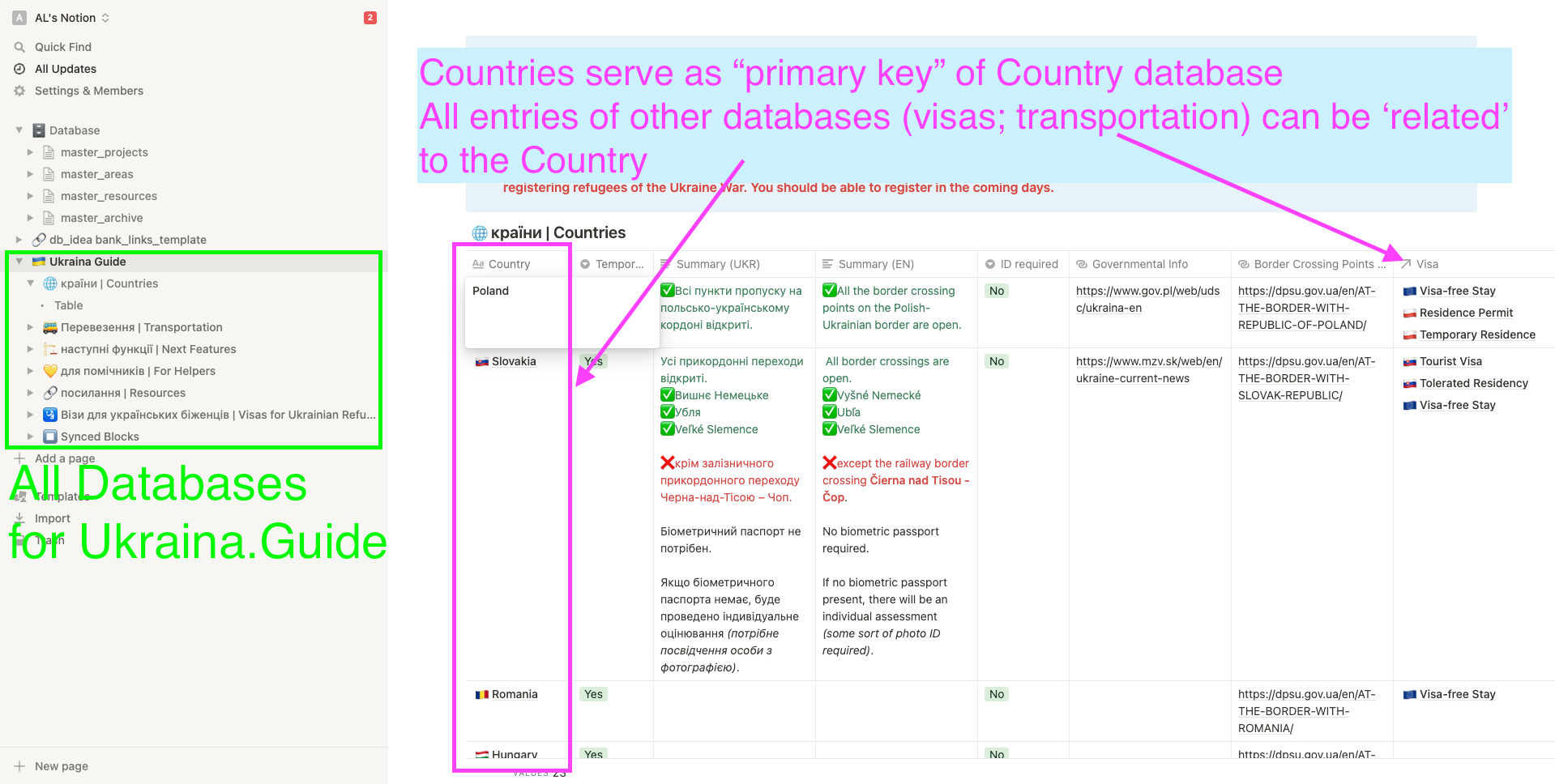
I set up my Notion databases as I always do.
Step #2: Buy Domain + Set Up Website
I did a quick name search on InstantDomainSearch and landed on ukraina.guide - a nice descriptive domain name.
Why ukrainA and not ukrainE?
Well, in Ukrainian you refer to the country as Ukraina. The primary audience are refugees from Ukraine. That's why it ends on an 'a' and not on an 'e'.
How did I set up the website?
I used super.so - a service that renders Notion pages into super fast static websites. On top, you can set your custom domains so that instead of this:
https://www.notion.so/Ukraina-Guide-5bc5b0d5d2fa4a0eb71231231231231231231
you get this:
This is what super looks on the backend 👇
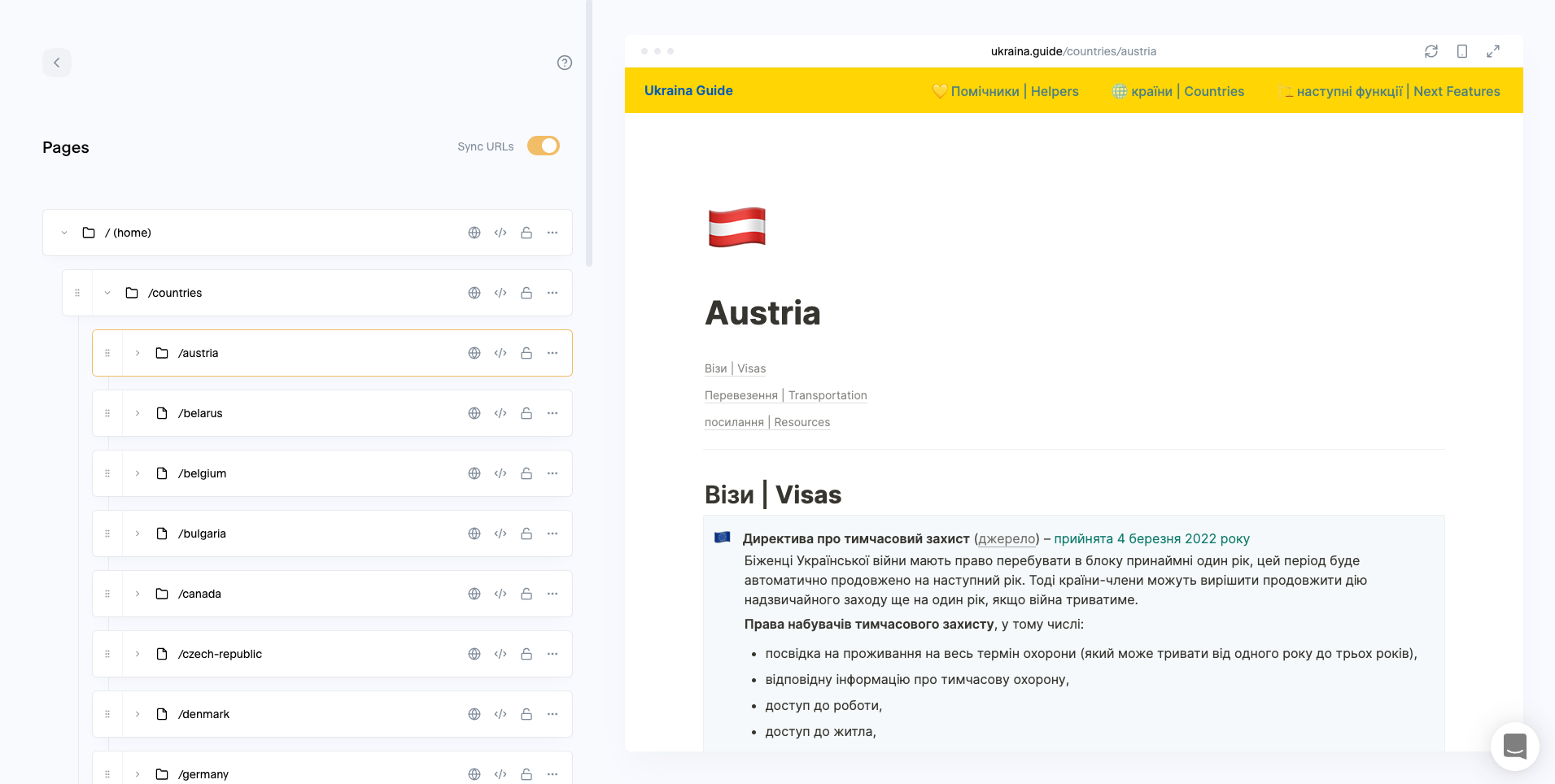
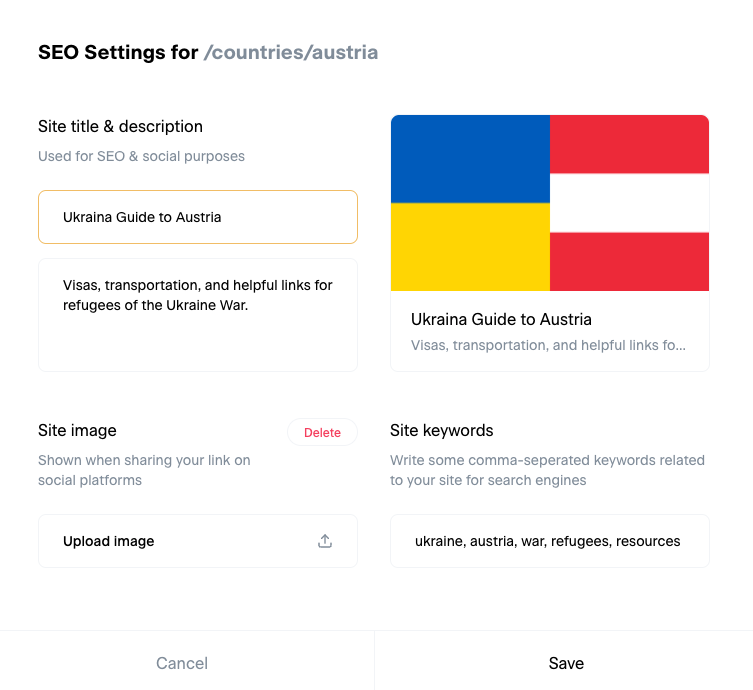
Step #3: Tool Stack + Management of Information
Many tools in my tool stack are free to use:
- Notion: Database + CMS [free]
- Namecheap: Domain hosting & management [$28.16/yr]
- Super: Rendering of Notion pages into static websites on a custom domain [€12/mo]
- Tally: Form at the bottom of ukraina.guide to collect user feedback [free]
- Figma: Free design tool to create share images for website [free]
- Plausible: Privacy-friendly analytics, that I use for all my projects [€107.10/yr]
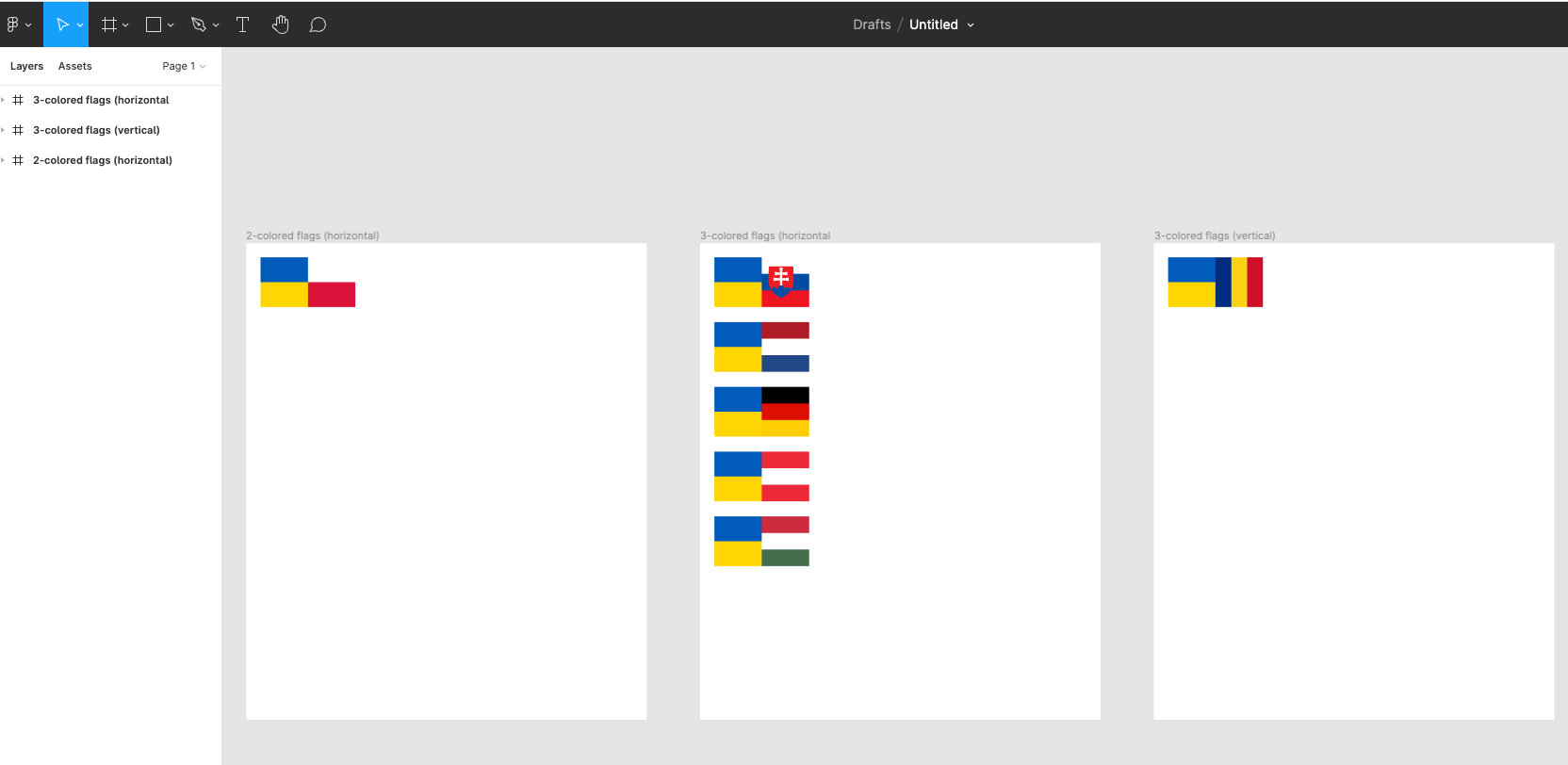
Ukraina.Guide: How Is It Going?
This is the most meaningful project that I've worked on so far:
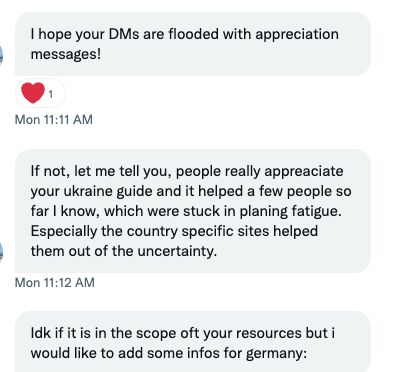
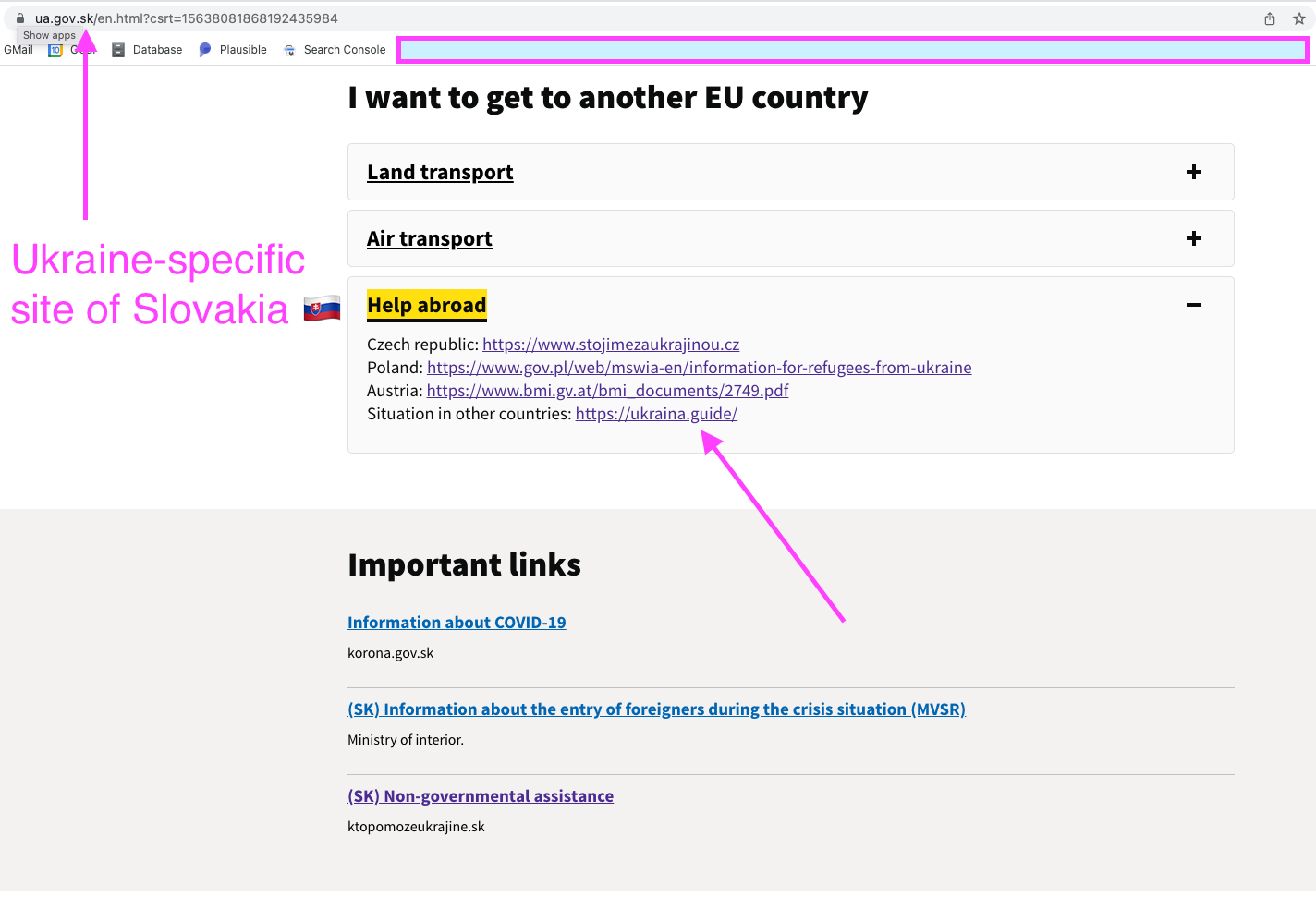
Traffic numbers seem to be going up and I might have to upgrade my analytics subscription.
Analytics for https://t.co/KclqW2Xi6h
— Art 🇺🇦 | (visa for refugees in bio) (@artlapinsch) March 10, 2022
📈 ~3k views in 2 weeks
🔗 Backlink from Ukraine-specific government website of Slovakia
🇵🇱 Country-specific resource are being used
Please share with ppl who might need this.
Let me know if you have feedback/requests/etc. 🙏 pic.twitter.com/bYJmf7MpeU
Ukraina.Guide: What's Next?
Luckily most of the information in the guide is solid-state information. It means it doesn't change much. (I created an entire online course about this)
The European Union has helped with this, since it has done a truly 80/20 effort on the refugee visa topic: The EU activated the Temporary Protection Directive for the first time in its history 🇪🇺
I wrote on Ukraina.Guide what this means:
Refugees of the Ukraine War are given the right to stay inside the bloc for at least one year, a period that will be automatically extended for a further year. Member states can then decide to prolong the exceptional measure by one more year if the war continues.
Rights for the beneficiaries of temporary protection, including:
* a residence permit for the entire duration of the protection (which can last from one year to three years),
* appropriate information on temporary protection,
* access to employment,
* access to accommodation or housing,
* access to social welfare or means of subsistence,
* access to medical treatment,
* access to education for minors,
* opportunities for families to reunite in certain circumstances, and
* guarantees for access to the normal asylum procedure.
The protection will apply to Ukrainian nationals and their relatives, as well as to long-term residents from other nationalities who are unable to go back safely to their country of origin.
Short-term residents, like seasonal workers and exchange students, will not benefit from the temporary protection but will be nevertheless allowed to enter EU territory to plan their return trips.
It is recommended not to submit an application for asylum. The Temporary Protection Directive is valid immediately.
Since this is the first time the Temporary Protection Directive has been invoked in the EU, countries have to set up offline and online infrastructure for registering refugees of the Ukraine War. You should be able to register in the coming days.
TL;DR: If you know anyone who fled from Ukraine, they have the right to stay and work in the EU for up to three years.
Any feedback helps and I will update the site whenever I find/receive new information.
The main takeaway: Each of us can help in different ways.
Look inside and see what you are particularly good at. This can be your starting point.
What's Next: Policy, Energy, and OSINT
I don't know what I'll build or write next.
But I know what I'm curious about:
#1: EU Policy x Energy 🔋
A massive red flag during the past two weeks was Germany's energy dependency on Russian oil/gas and how it seemingly impacted policy decisions.
I want to understand the high-level picture and then drill down into the details:
- Basics (what is energy)
- Energy Demand (who/what/how much)
- Energy Supply (who/what/how much)
- Delta (which levers we can adjust to play with supply/demand)
- Infrastructure (extraction; transportation; storage; utilization)
- Value Chain (who are the players)
- Legal (constraints; requirements)
- Policy (how does all of the above depend on and inform policy)
Most likely I will write a couple of posts about this to understand it myself.
#2: OSINT 🕵️
OSINT = Open-source intelligence
What is it? Read this article for a good primer 👇
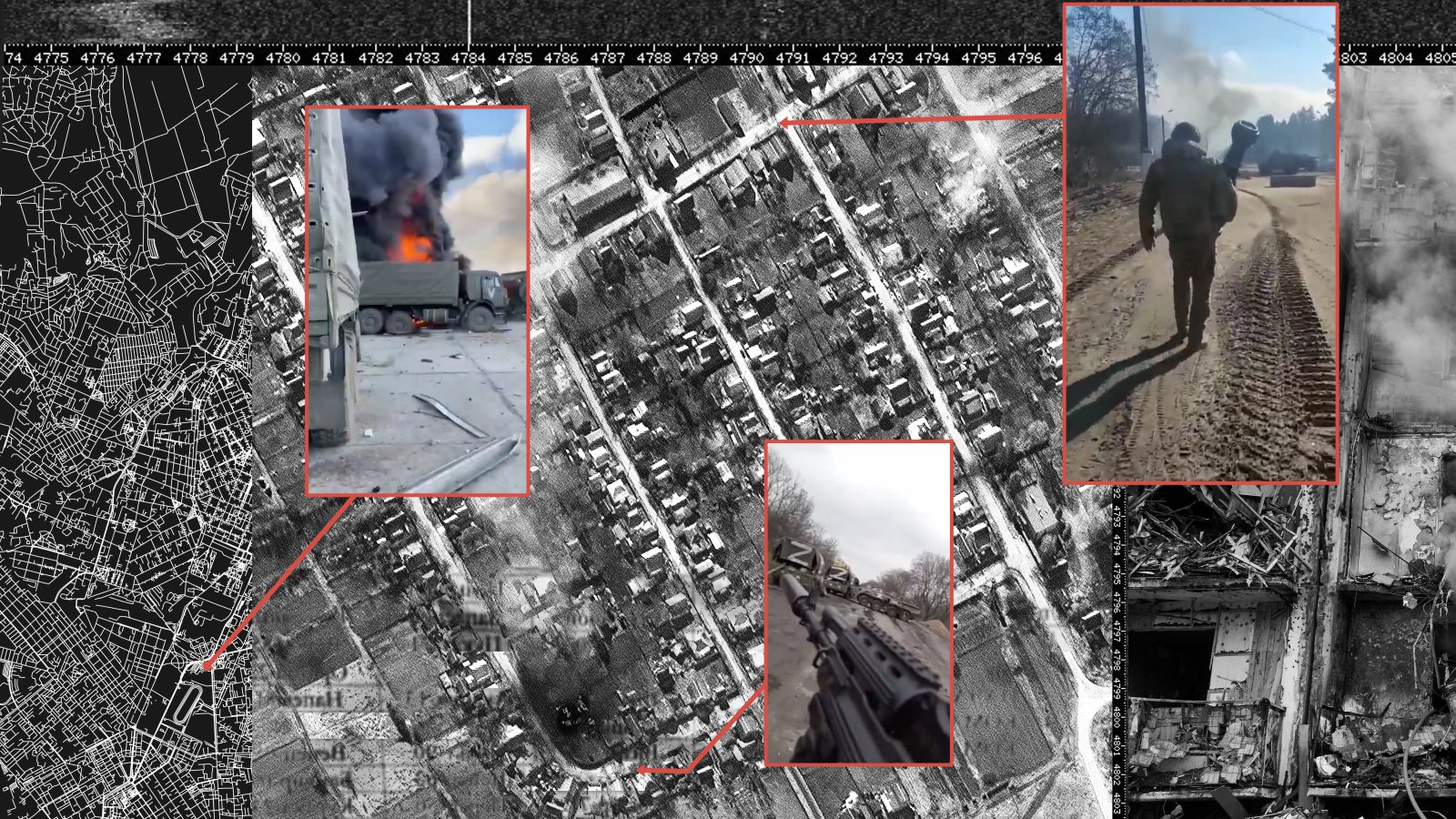
Why is it useful? Collectives like Bellingcat are working with open-sourece researchers to document war crimes.
Irrefutable/data-driven evidence of war crimes is collected and validated.
This makes it easier for organizations such as the ICC (International Criminal Court) to build a case against war criminals.
Other Resources
Helpful/interesting links I have found over the past weeks:
Help
- Resources for refugees coming from Ukraine 🇺🇦 [Ukraina.Guide]
- Resources for people trying to leave Russia 🇷🇺 [?]
General
- Long-form analyses about the crisis region (Russia/Ukraine/Chechnya/...) [Kamil Galeev] → One of the best writers I have discovered over the past weeks
- Belllingcat's Lead Russia Analyst [Christo Grozev] → real-time pulse on all things related to the Ukraine War
Business/Economics
- SWIFT: Moving Money Internationally [Pat McKenzie] → Patrick is one of the best writers about the payment industry. This is a great overview of SWIFT as an extended policy instrument to execute "Commander's Intent"
- Tech and War [Ben Thompson] → Ben writes about the important distinction between "capabilities vs intentions" when it comes to tech companies... the corollary is that tech platforms are potentially powerful policy tools similar to SWIFT
- How are the Big Sanctions hurting Russia so far? [Noah Smith] → Private company sanctions + inflation + import-dependence = no bueno
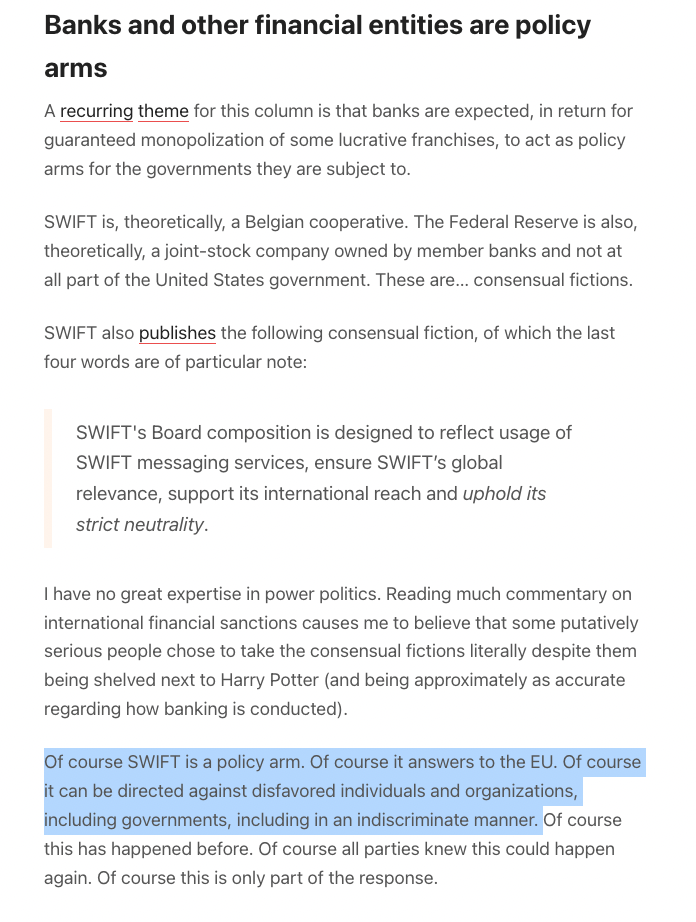
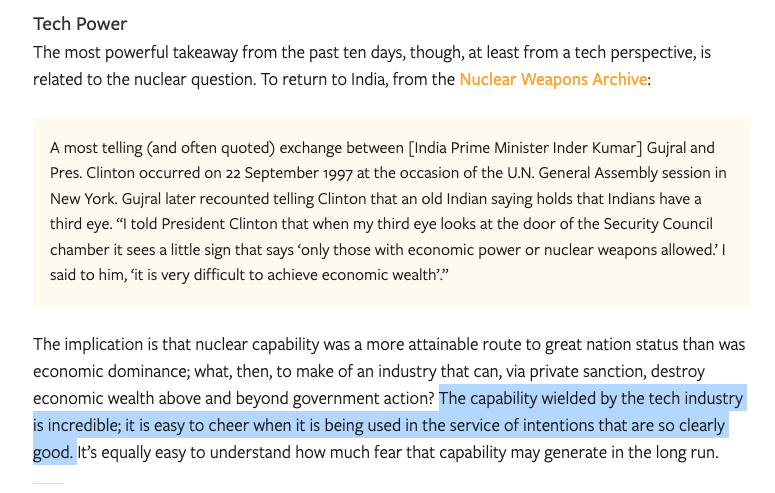
Policy/Intelligence
- Pod Save the World [Tommy Vietor & Ben Rhodes] → No-BS conversations about policy (both worked in different functions during the Obama Administration)
Twelve Projects
Chances are you have been following me because of my focus on company building and micro-businesses.
Earlier this year I started the 12 projects in 12 months challenge and so far I have shipped 11 finished projects.
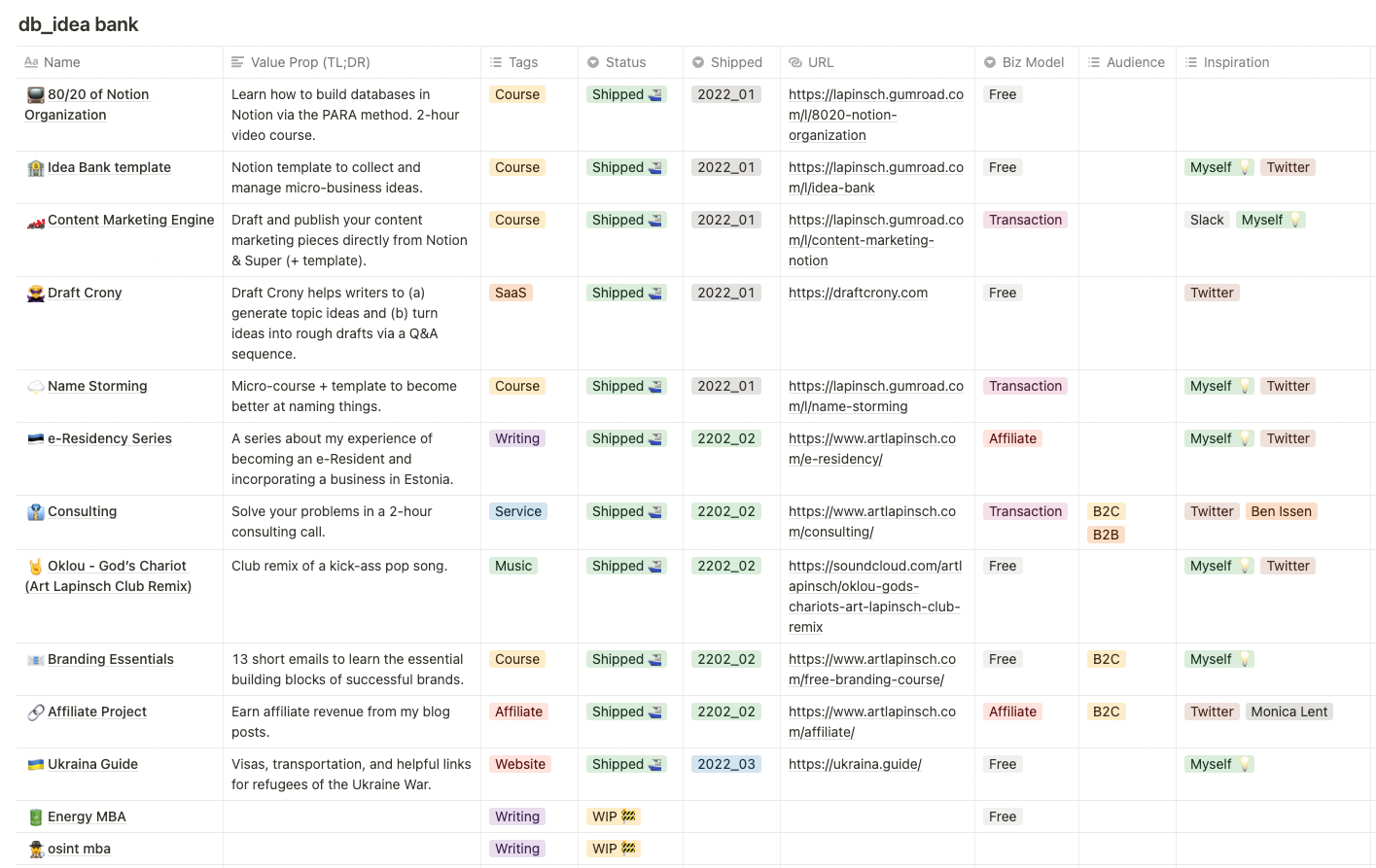
I have to be honest: I don't know what the coming weeks will bring.
Last time I sent this newsletter I wrote about our experience fleeing the War in Yugoslavia. Many of you have replied (Charlene; Emmy; Sunil; Mo; David; Marko; Simon; Elie; Mat; and many others).
I wanted to thank you for that! In times like these it goes a long way.
If you are reading this I would love to know what you are up.
Just reply to this email and tell me wassup. 🙌
Peace, Art

